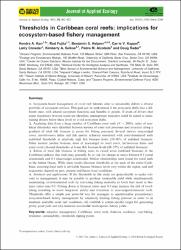| Author | Karr, Kendra A. | |
| Author | Fujita, Rod | |
| Author | Halpern, Benjamin S. | |
| Author | Kappel, Carrie V. | |
| Author | Crowder, Larry | |
| Author | Selkoe, Kimberly A. | |
| Author | Alcolado, Pedro M. | |
| Author | Rader, Doug | |
| Accessioned date | 2025-02-21T23:51:46Z | |
| Available date | 2025-02-21T23:51:46Z | |
| Year | 2014 | |
| Citation | Karr, K. A., Fujita, R., Halpern, B. S., Kappel, C. V., Crowder, L., Selkoe, K. A., ... & Rader, D. (2015). Thresholds in Caribbean coral reefs: implications for ecosystem-based fishery management. Journal of Applied Ecology, 52(2), 402-412. Recuperado de: | es |
| URI | https://bvearmb.do/handle/123456789/5845 | |
| Abstract | This article describes how ecosystem-based fishery management can preserve coral reefs by preventing transitions to degraded states. Analyzing 2,001 Caribbean reefs, researchers identified nonlinear thresholds in total fish biomass affecting ecosystem processes and structures. Two threshold ranges were found: one between 50–88% of unfished biomass, associated with coral-dominated reefs, and another between 28–37%, linked to increased macroalgal cover. Fish biomass ratios in fishing areas compared to protected zones suggest that reefs with a ratio of 0.5 remain healthy, while values near 0.3 increase the risk of degradation. Applying these thresholds could enable precautionary fishery management, ensuring both ecosystem sustainability and adequate fishery yields. | es |
| Language | English | es |
| Published | Journal of Applied Ecology, 52(2), 402-412 | es |
| Rights | © 2014 The Authors. Journal of Applied Ecology © 2014 British Ecological Society. Available at: https://besjournals.onlinelibrary.wiley.com/ | es |
| Subject | Recursos naturales | es |
| Subject | Recursos costeros y marinos | es |
| Subject | Arrecifes de coral | es |
| Subject | Pesca sostenible | es |
| Title | Thresholds in Caribbean coral reefs : implications for ecosystem-based fishery management | es |
| dc.identifier.doi | 10.1111/1365-2664.12388 | |
| Material type | Article | es |
| Type of content | Scientific research | es |
| Access | Open | es |
| Audience | Technicians, professionals and scientists | es |


